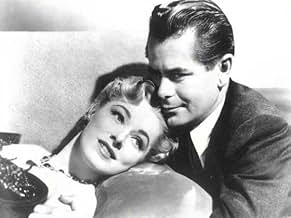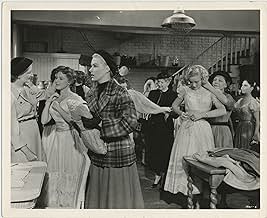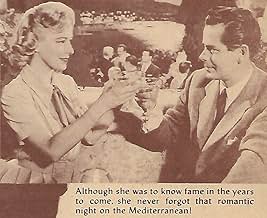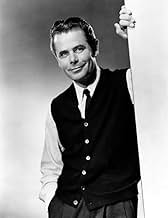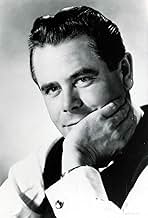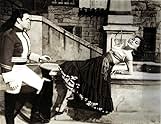IMDb-BEWERTUNG
6,7/10
1287
IHRE BEWERTUNG
Füge eine Handlung in deiner Sprache hinzuThis movie chronicles Australian-born opera star Marjorie Lawrence's success, her battle with polio, and her eventual career comeback.This movie chronicles Australian-born opera star Marjorie Lawrence's success, her battle with polio, and her eventual career comeback.This movie chronicles Australian-born opera star Marjorie Lawrence's success, her battle with polio, and her eventual career comeback.
- Regie
- Drehbuch
- Hauptbesetzung
- 1 Oscar gewonnen
- 1 Gewinn & 3 Nominierungen insgesamt
Phyllis Altivo
- Louise
- (Nicht genannt)
Benjie Bancroft
- Doctor
- (Nicht genannt)
Francis Barnes
- Singer
- (Nicht genannt)
Louise Bates
- Party Guest
- (Nicht genannt)
Mary Bayless
- Backstage Well-Wisher
- (Nicht genannt)
George Blagoi
- Audience Member
- (Nicht genannt)
Heinz Blankenburg
- Baritone
- (Nicht genannt)
Lulu Mae Bohrman
- Backstage Well-Wisher
- (Nicht genannt)
Empfohlene Bewertungen
I studied opera with Marjorie Lawrence and her students always enjoyed gathering to watch this film.
I studied opera with Marjorie Lawrence in the 1970's and she was an incredible, vital, and exciting personality. She was larger than life and her presence dominated any gathering she attended.
The movie captures many of her physical mannerisms. Her voice was most suited to the Wagnerian repertoire and the selection of the great Eileen Farrel to sing the more popular arias chosen for the film was an excellent one. However, Miss Lawrence was disappointed that her own voice wasn't used as had been agreed, which I understand resulted in a settlement in her favor.
Her husband, Doctor King, was an great gentleman and devoted to her.
Following the years depicted in the film, she became an educator at Southern Illinois University where she was very respected and loved.
The movie captures many of her physical mannerisms. Her voice was most suited to the Wagnerian repertoire and the selection of the great Eileen Farrel to sing the more popular arias chosen for the film was an excellent one. However, Miss Lawrence was disappointed that her own voice wasn't used as had been agreed, which I understand resulted in a settlement in her favor.
Her husband, Doctor King, was an great gentleman and devoted to her.
Following the years depicted in the film, she became an educator at Southern Illinois University where she was very respected and loved.
I am a great-niece of Marjorie Lawrence. It's a very sad fact that Marjorie is best known outside of Australia. However, she was recently honored as one of 100 Australian Entertainers of the Century. It's also a bit of a shame that this movie is a Hollywood producer's interpretation of an American publisher's version of my Great-Aunt's life. The real family story is actually much more interesting. Auntie Marj never smoked a cigarette in her life - but it seems everyone smoked in the movies of the 50s. My mother and my aunt attended the world premiere here in Melbourne. I remember meeting Auntie Marj as a child in the 70s.
'Interrupted Melody' is the film adaptation of Australian soprano Marjorie Lawrence's autobiography. It tells the fascinating tale of the young woman's thunderous ascent to stardom, her marriage to Dr Thomas King (Glenn Ford), and finally deals with her struggles with polio.
The great Eleanor Parker delivers a fantastic performance as Lawrence (with the equally fine Eileen Farrell providing the voice of the Australian prima donna). Parker's acting here is wonderfully appropriate, and captures the intense but subtly delicate style of the great operatic stars of the time. With sumptuous sets, costumes and, of course, music, 'Interrupted Melody' seems to equate to a practically perfect film. In my opinion though, the reality is not quite the case. Lawrence's story is one that is wrought with drama and this movie just doesn't do it complete justice.
Nevertheless, 'Interrupted Melody' is a film worth seeing, for all the reasons mentioned earlier. There are many memorable scenes throughout the movie; the ones that deal with her battle against illness are particularly moving. And when, finally, she triumphs after a great fight, both emotionally and physically, it is indeed very poignant.
The great Eleanor Parker delivers a fantastic performance as Lawrence (with the equally fine Eileen Farrell providing the voice of the Australian prima donna). Parker's acting here is wonderfully appropriate, and captures the intense but subtly delicate style of the great operatic stars of the time. With sumptuous sets, costumes and, of course, music, 'Interrupted Melody' seems to equate to a practically perfect film. In my opinion though, the reality is not quite the case. Lawrence's story is one that is wrought with drama and this movie just doesn't do it complete justice.
Nevertheless, 'Interrupted Melody' is a film worth seeing, for all the reasons mentioned earlier. There are many memorable scenes throughout the movie; the ones that deal with her battle against illness are particularly moving. And when, finally, she triumphs after a great fight, both emotionally and physically, it is indeed very poignant.
Eleanor Parker, a much underrated actress of the 1950s, probably hit the high point of her career when she essayed the role of Marjorie Lawrence in this biographical portrait.
Marjorie Lawrence was an Australian opera star whose career was cruelly interrupted by polio in the 1930s. The film follows Lawrence from her winning a singing contest in her native Winchelsea, Australia through her career with the Metropolitan Opera and her struggle with regaining her health. Lawrence is supported every step of the way by husband Dr. Thomas King,ably played by Glenn Ford. But it's Eleanor Parker's movie all the way.
Funny for a movie about an Australian, Parker doesn't even attempt an Australian accent. This is in the MGM tradition of Clark Gable who did not attempt any British accent in Mutiny on the Bounty. It worked just as well for Parker, though I'd be curious what a native Australian might think. Lawrence was the second female opera star who became a national treasure for Australia, the first being Nellie Melba. Parker shouldered a lot of tradition in this film and did it well.
The voice used by Parker for the operatic sequences is that of Eileen Farrell of the Metropolitan Opera. The sequences are well done, but the real drama in the scenes of Lawrence battling polio.
This film coincidentally enough came out at the same time that Dr. Jonas Salk discovered his vaccine preventive for polio. I still remember as a lad getting those polio shots at my public school. No movie studio could have planned that coincidence, but MGM reaped enormous profit because of it. As for Jonas Salk, no man of medicine has ever been admired in the same way in my lifetime.
Eleanor Parker was nominated for best actress, but lost that year to Anna Magnani in The Rose Tattoo. Look for a young Roger Moore in the role of Parker's brother and business manager.
My favorite scene in the whole film is Parker as Lawrence entertaining the troops overseas in World War II. Especially when she sings Waltzing Matilda to her native Australian diggers. It was like the whole beating heart of the Australian continent coming alive for an instant. Absolutely inspired.
This film gets the highest possible recommendation from me.
Marjorie Lawrence was an Australian opera star whose career was cruelly interrupted by polio in the 1930s. The film follows Lawrence from her winning a singing contest in her native Winchelsea, Australia through her career with the Metropolitan Opera and her struggle with regaining her health. Lawrence is supported every step of the way by husband Dr. Thomas King,ably played by Glenn Ford. But it's Eleanor Parker's movie all the way.
Funny for a movie about an Australian, Parker doesn't even attempt an Australian accent. This is in the MGM tradition of Clark Gable who did not attempt any British accent in Mutiny on the Bounty. It worked just as well for Parker, though I'd be curious what a native Australian might think. Lawrence was the second female opera star who became a national treasure for Australia, the first being Nellie Melba. Parker shouldered a lot of tradition in this film and did it well.
The voice used by Parker for the operatic sequences is that of Eileen Farrell of the Metropolitan Opera. The sequences are well done, but the real drama in the scenes of Lawrence battling polio.
This film coincidentally enough came out at the same time that Dr. Jonas Salk discovered his vaccine preventive for polio. I still remember as a lad getting those polio shots at my public school. No movie studio could have planned that coincidence, but MGM reaped enormous profit because of it. As for Jonas Salk, no man of medicine has ever been admired in the same way in my lifetime.
Eleanor Parker was nominated for best actress, but lost that year to Anna Magnani in The Rose Tattoo. Look for a young Roger Moore in the role of Parker's brother and business manager.
My favorite scene in the whole film is Parker as Lawrence entertaining the troops overseas in World War II. Especially when she sings Waltzing Matilda to her native Australian diggers. It was like the whole beating heart of the Australian continent coming alive for an instant. Absolutely inspired.
This film gets the highest possible recommendation from me.
MGM fashioned a sumptuous, full-scale production in bringing the career of Australian opera diva Marjorie Lawrence to the screen. Heading the cast as Lawrence is the fine Eleanor Parker, in one of her most impressive roles. Co-starring as her supportive doctor-husband is the talented Glenn Ford. Both are most convincing in relaying the inspirational "real life" story of their struggle with physical- career- and marital-obstacles.
Whether Lawrence did in fact sing roles which included lyric soprano, dramatic soprano, mezzo and Wagnerian, as depicted here, is open to question. Still, it is lovely to see these excerpts staged so beautifully, and in gorgeous Technicolor. Of invaluable assistance is the magnificent voice of Eileen Farrell in a remarkably varied repertoire.
It may not be possible to experience the real impact of these scenes unless there is a special house revival with a full-sized Cinemascope screen and stereo sound. The formats of VHS and even DVD to not do justice to the original production.
Although Lawrence assisted on the script, the actual unfoldment has the ring of fact merging with fiction for maximum dramatic impact. Now that Lawrence's 30's and 40's career is but a memory in the minds of a few, what remains is this romanticized version of history. As such, lovers of romantic drama and of music may revel in a tale of ardor and challenge, with the artistic product being the "fusion of the arts": grand opera.
Whether Lawrence did in fact sing roles which included lyric soprano, dramatic soprano, mezzo and Wagnerian, as depicted here, is open to question. Still, it is lovely to see these excerpts staged so beautifully, and in gorgeous Technicolor. Of invaluable assistance is the magnificent voice of Eileen Farrell in a remarkably varied repertoire.
It may not be possible to experience the real impact of these scenes unless there is a special house revival with a full-sized Cinemascope screen and stereo sound. The formats of VHS and even DVD to not do justice to the original production.
Although Lawrence assisted on the script, the actual unfoldment has the ring of fact merging with fiction for maximum dramatic impact. Now that Lawrence's 30's and 40's career is but a memory in the minds of a few, what remains is this romanticized version of history. As such, lovers of romantic drama and of music may revel in a tale of ardor and challenge, with the artistic product being the "fusion of the arts": grand opera.
Wusstest du schon
- WissenswertesEleanor Parker can read music, and has perfect pitch as a singer. She decided to study the scores of the opera songs used in this movie on her own. She rented a cabin in Lake Arrowhead, California, and played the records while singing along, until she had the breathing and phrasing memorized. Then when filming the scenes, instead of lip-synching to the tracks recorded by Eileen Farrell for the movie, she sang full voice (but an octave lower). She is proud of the fact that they never had to do a re-take, in order to "match" the tapes. She nailed it on the first take every time.
- PatzerAfter Marjorie sings "Annie Laurie" and she wheels herself into the kitchen and she suggests a concert tour, right as she and Dr. King are embracing .
- Zitate
Marjorie Lawrence: [drinking champagne] Tonight I love the whole world and I want them to know it.
Dr. Thomas King: And tomorrow you'll have a monumental hangover.
Marjorie Lawrence: That's the advantage of going out with doctors.
- VerbindungenFeatured in 1955 Motion Picture Theatre Celebration (1955)
- SoundtracksDon Carlos
(1867) (uncredited)
Music by Giuseppe Verdi
Libretto by François Joseph Méry and Camille du Locle
Aria "O don fatale" Performed by Eleanor Parker (dubbed by Eileen Farrell) with piano accompaniment
Top-Auswahl
Melde dich zum Bewerten an und greife auf die Watchlist für personalisierte Empfehlungen zu.
- How long is Interrupted Melody?Powered by Alexa
Details
- Erscheinungsdatum
- Herkunftsland
- Sprachen
- Auch bekannt als
- La melodía interrumpida
- Drehorte
- Produktionsfirma
- Weitere beteiligte Unternehmen bei IMDbPro anzeigen
Box Office
- Budget
- 2.367.000 $ (geschätzt)
- Laufzeit1 Stunde 46 Minuten
- Seitenverhältnis
- 2.55 : 1
Zu dieser Seite beitragen
Bearbeitung vorschlagen oder fehlenden Inhalt hinzufügen

Oberste Lücke
By what name was Unterbrochene Melodie (1955) officially released in India in English?
Antwort


